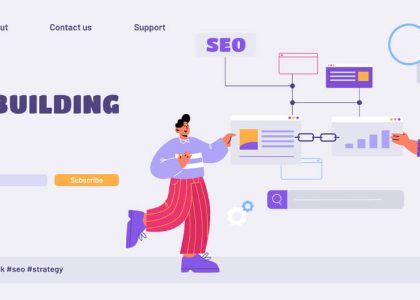Search Engine Optimization (SEO) is a principal digital marketing strategy that helps websites rank higher in search engine results pages (SERPs). For beginners, understanding SEO may seem complex, but with the right guidance, anyone can master its fundamentals. This guide breaks down the core elements of SEO for beginners, making it easier for newcomers to grasp its significance and implementation.
What Is SEO? SEO for Beginners
SEO is the process of optimizing your website to make it more visible to search engines like Google, Bing, and Yahoo. When users search for specific terms or phrases, search engines aim to provide the most relevant and high-quality results. SEO for beginners helps you understand how to make your website rank higher for these terms, increasing visibility and driving organic traffic.
- Increased Visibility: Higher rankings on SERPs mean more people will see your website.
- Cost-Effective Marketing: Unlike paid ads, SEO focuses on organic traffic, which is free.
- Builds Credibility: Ranking on the first page signals to users that your site is trustworthy and authoritative.
- Boosts User Experience: Good SEO practices improve site usability, benefiting both search engines and visitors.
How Search Engines Work
To understand SEO for beginners, it’s essential to know how search engines work. They perform three primary functions:
- Crawling: Search engines use bots, also known as spiders, to crawl the web and discover new or updated content.
- Indexing: Once the content is discovered, search engines store and organize it in their database.
- Ranking: Search engines analyze the content and rank it based on relevance and quality when users search for related terms.
Types of SEO for Beginners to Expert
SEO can be divided into several categories, each focusing on different aspects of optimization:
- On-Page SEO: Optimizing elements within your site, such as content, headings, and meta tags.
- Off-Page SEO: Building backlinks and increasing your website’s authority through external sources.
- Technical SEO: Improving site performance, including page speed, mobile-friendliness, and crawlability.
- Local SEO: Optimizing for local search results to target audiences in specific geographic locations.
Essential On-Page SEO Factors
- Keyword Research and Optimization
- Identify relevant keywords using tools like Google Keyword Planner or Ahrefs.
- Place keywords strategically in titles, meta descriptions, headings, and content.
- Quality Content
- Create valuable and engaging content that addresses users’ needs.
- Use a mix of text, images, and videos to improve readability and engagement.
- Meta Tags
- Write compelling meta titles and descriptions to attract clicks.
- Ensure each page has unique and descriptive meta tags.
- Internal Linking
- Link to other pages on your site to improve navigation and distribute link equity.
- User Experience (UX)
- Use clear navigation and responsive design to ensure users can easily access information.
Key Off-Page SEO Strategies
- Backlink Building
- Earn high-quality backlinks from reputable websites.
- Avoid spammy links, as they can harm your rankings.
- Social Media Engagement
- Share your content on social platforms to increase visibility and traffic.
- Brand Mentions
- Build your brand’s online reputation by encouraging mentions on other websites.
The Role of Technical SEO
- Site Speed
- Optimize images and use caching to improve loading times.
- Mobile-Friendliness
- Ensure your site is responsive and works seamlessly on all devices.
- Structured Data
- Implement structured markup to help search engines understand your content better.
- Secure Site (HTTPS)
- Use an SSL certificate to secure user data and improve rankings.
Measuring SEO Success
Use analytics tools to track your SEO progress:
- Google Analytics: Monitor traffic, bounce rates, and user behavior.
- Google Search Console: Track search performance and identify indexing issues.
- Keyword Tracking Tools: Check your rankings for targeted keywords.
Common SEO Mistakes to Avoid
- Keyword Stuffing: Overusing keywords can lead to penalties.
- Ignoring Mobile Optimization: A non-responsive site loses mobile traffic.
- Neglecting Technical SEO: Poor site performance can ruin rankings.
- Buying Backlinks: Spammy practices can result in search engine penalties.
Conclusion
SEO for beginners is an ever-evolving field that requires continuous learning and adaptation. By understanding its basics and implementing best practices, beginners can significantly improve their website’s visibility and attract organic traffic. Focus on creating valuable content, optimizing key on-page and off-page factors, and maintaining good technical SEO practices. SEO for Beginners to Expert.







Thanks for sharing. I read many of your blog posts, cool, your blog is very good.
Thank you so much for your kind words!